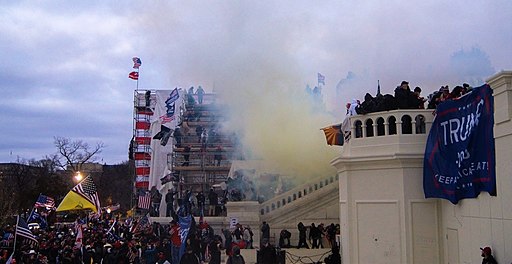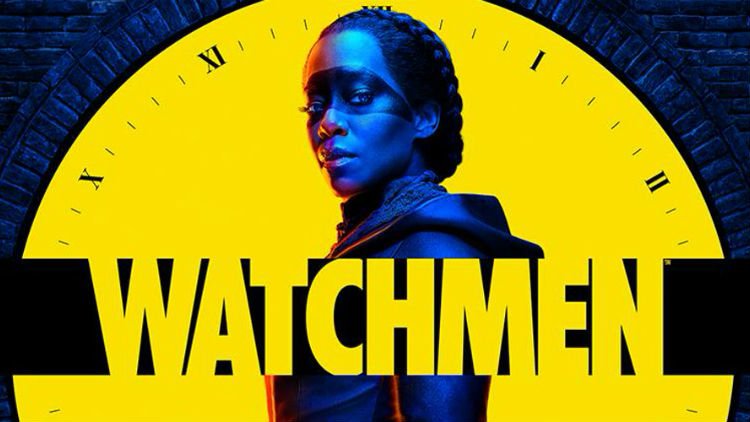This review contains spoilers.
When HBO’s Watchmen dropped in Fall 2019, critics received it with widespread acclaim. Based on the seminal graphic novel by Alan Moore and Dave Gibbons, the television series is a sequel both in terms of narrative and spirit. Rather than simply offering a continuation of the original plot (as a concurrent DC comic book attempted), HBO’s Watchmen manages to achieve the heights of its source material by engaging with the social fractures of our times. The limited series is not a single story—it’s about how people with their own stories, traumas, and secrets are brought together by a conspiracy that threatens the collective good. It’s also a dark reflection of the America we live in, as well as our unreconstructed past.
The first episode opens in a striking and unexpected way: a depiction of the real-world Tulsa Race Massacre, the 1921 destruction of an Oklahoma business district known as Black Wall Street. The visuals are not what we’re used to seeing on television. Black men are dragged through the streets and a young boy watches as his family is murdered. To call the scene upsetting would be an understatement, and although it could be seen as exploitative, it conveys the unlimited brutality of racial violence in America better than most documentaries. I’ve never been to Tulsa, but the opening scenes transported me back to Little Rock’s West Ninth Street, another successful Black business district that endured a century of racial terror before being eroded by the unrelenting pressures of urban renewal. The Tulsa Race Massacre is a far cry from what you would expect from the opening of a superhero series, but Watchmen has always been about exploring the meaning of justice when you look past the colorful costumes.
In the aftermath of the original Watchmen story, the US government launched designated efforts to provide reparations for victims of the massacre and interpret its history in an attempt to reckon with the past. Despite these efforts, far more than has been attempted in our own America, Watchmen’s Tulsa reflects the ongoing struggle for justice and equality, a situation that escalates amid a white supremacist backlash. For the victims and their families, reparations and genealogy provide a start to the healing process, but intergenerational trauma persists until they are able to come to terms with their history on a personal level.
I missed Watchmen when it first aired. Seeing it in the second half of 2020 through the prism of the George Floyd protests and reflecting on it in the wake of January 6 gives it an eerie sense of prescience. Its commentary on race and policing has been relevant for years, but the visuals of masked police officers and white supremacists is so resonant today that it’s hard to imagine this series predated the past year. The focus on Tulsa was especially striking given it was the site of Trump’s first post-lockdown superspreader rally there in June, postponed from its original date of Juneteenth amid racial justice protests (HBO made Watchmen free to viewers that weekend). The embattled police, meanwhile, remind me now of Officer Eugene Goodman and the Capitol Police who risked their lives to protect democracy.

Meanwhile, the white supremacist factions–the Seventh Cavalry and Cyclops–give serious QAnon vibes and respectively embody America’s dual tradition of popular racial grievance and elite manipulation. Toward the end of the series, the leader of these groups asserts “I’m not a racist, but the scales have tipped too far and it’s hard to be a white man in America.” This from a rich white man following in his father’s footsteps as a US senator. When I first watched, he resembled a generic representation of racism cloaked in patriotism and respectability; in hindsight, it’s hard to think of him without being reminded of Senator Josh Hawley.
Some critics have observed that the statements Watchmen makes are more provocative than insightful, and there are times when this is true. The focus on the masked police—a majority Black force fighting white supremacists—has implications that are dropped later in the season as the main plot turns to how elites weaponize both sides of culture war and racial conflict. Perhaps it seems like they dropped the ball mostly because these themes now seem more urgent than ever, and it feels like we need to start answering complex questions instead of just raising them.
At its core, Watchmen is about justice in all its forms and contradictions. It invokes the tensions between vengeance and healing, vigilantism and the law, and power and accountability. But the most poignant reflection on justice comes in the final episode, as a Tulsa survivor who turned to vigilante justice reflects on how it took him his entire life to accept that the anger that drove him was actually fear and hurt. “You can’t heal under a mask,” he tells his granddaughter, struggling to make sense of her family’s trauma and her own. “Wounds need air.”
